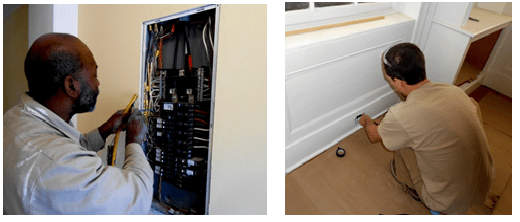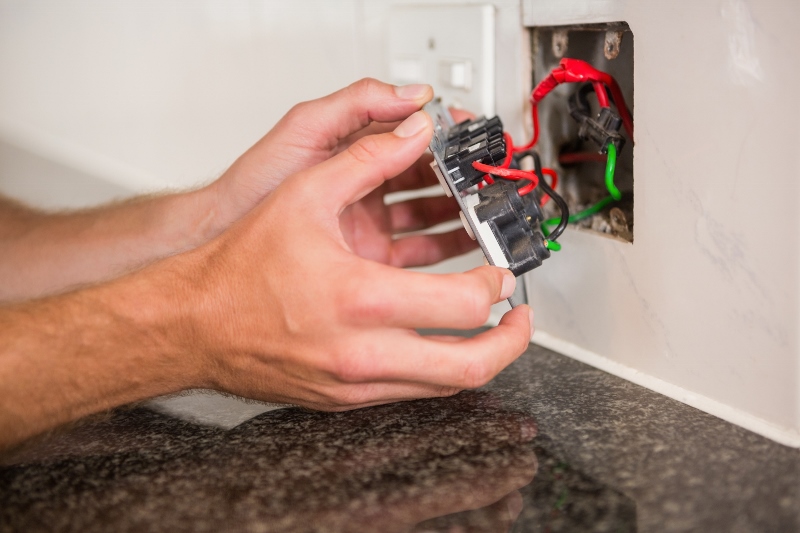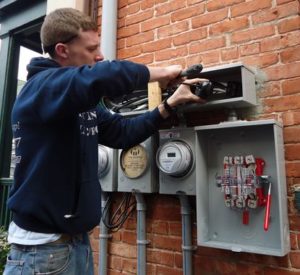Why You Shouldn’t DIY Electrical Work
There are few aspects of home improvement that can be as fraught with danger as that of “Do-It-Yourself” electrical repairs. And while it may be a tempting prospect to forgo calling an electrician with the idea of saving a few bucks, then end results can be catastrophic. Here are some reasons why you shouldn’t DIY with electrical work.
Electrical Shock
It is no secret that one of the foremost concerns when working around electricity is the danger of being shocked. Electrical shock can be deadly at nearly any voltage level, and this is especially true when working with higher voltages.
In most residential homes the average voltage for lighting and power outlets is around 110 volts. That’s certainly enough to give you a nice jolt, but the voltage levels for certain appliances, such as ovens and dryers, can reach 240 volts – a deadly amount of current. It is for this reason that residential electricians go through years of training to learn how to safely work around electricity. Sure, you can always turn off the power at the breaker box, but all too often DIYers either neglect this step or switch off the incorrect breaker and this leads to a dangerous situation.
Fire Hazards
As with electrical shock, the danger of causing a fire due to faulty wiring is a real concern for DIYers. With so many different electrical components to work with, it can be confusing trying to solve wiring issues. All it takes is the placement of a single wire in the wrong spot and the chances of an electrical fire significantly increase. And unlike electrical shock, where the results will be immediate, electrical fire hazards can remain dormant for months. This can lead electrical DIYers into a false sense of security after completing a project, and then weeks later the wiring shorts out causing a fire. This is why you should always hire an experienced electrician when there are problems with the electrical system.

Use of wires and cables that are the incorrect size
A variety of sizes of electric wire are available (referred to as its ‘gauge’) and the size of the wire determines how and where it should be used. If an incorrect sized wire for the electric current is selected and installed, this may result in overheating or a shorting of the fuse or circuit breaker. It is imperative that only the wire and devices that are rated for the proper amperage are used.
Incorrect fitting of outlets and switches: If outlets and switches are loosely installed, a hazard is presented when appliances are plugged in. Arcing and overheating may be the outcome of wires coming loose from their terminals.
Faults in electrical box connections: The purpose of the electrical box is to provide protection from external elements. In light of this, it is dangerous to attempt to make electrical connections outside of the electrical box and similarly, electrical boxes should not be added to or filled beyond their capacity; this can cause overheating or short-circuiting.
Replacement of fuses: One of the most common causes of fires in the home is that fuses that have blown or tripped are replaced with larger sized fuses or breakers. The reason for the fuse blowing or the breaker tripping is often the result of a fault in the circuit wiring. For this reason, the complete system should be looked at and checked by a professional electrician.

Your Insurance Company Will Not Cover Electrical Damage Costs
If a fire does occur in your home or any other kind of electrical issue, your insurance company may not cover the damage costs if the work is not done to code by a certified electrician.
Therefore, if you are thinking about having a DIY electrical work weekend it is best to call in the professionals. It will end up saving you time, money and even your home in the long run.
Serious Injury or Death Can Occur
Working on fixing up the electrical wires and fuses in your home without knowledge of what you are doing can lead to serious injury or death. You could cut the wrong wire with electricity flowing through it and end up with a serious electrical shock, or put fuses in the wrong spot causing them to spark a fire or overheat leading to serious burns.
You could also forget to ground the electricity elements properly, which could cause you or a love to receive an electrical shock that could be potentially fatal. These reasons alone are enough to keep from making the repairs yourself.

Faulty installation of a three-slot outlets.
Most older homes do not have ground wires at outlet locations. Rookies have been known to switch out the 2 prong outlet for a 3 prong without a ground. Not only does this violated code, in the event of a short circuit the cover plate will become energized with electricity and cause a deadly shock.
Confusing hot and neutral wires when installing an outlet.
If the hot wire is connected to the neutral terminal of an outlet you could get a serious shock. It’s difficult to detect this mistake until someone is dangerously hurt because lights and other electrical devices will still work.
Code violations and building permits
Nearly all communities require you to have a building permit for any significant electrical work. This isn’t just to keep track of the taxable value of your home or office! It’s also to make sure that any work done meets the local building and safety codes. In most cases, the permit must be requested by a licensed, professional electrician or an electrical contractor who employs licensed electricians.
Remember that unlicensed electrical work is against the law so individuals guilty of this can face severe fines of up to $100,000, while companies can be penalized up to $500,000, depending on the state or territory. You can also serve a prison sentence of two years. If your violation causes deaths, you’ll have to deal with larger penalties and a lengthier prison term.
Expensive repairs
Even if you are able to avoid a fire or other safety issue when performing DIY electrical repairs, connecting your wiring improperly can cause it to fail. Having to pay a professional electrician on top of the money and time you already spent to attempt DIY electrical wiring—will cost you more money in the end.
However, in every instance, a certified and professional electrician should be sought to complete all electrical service work. It is simply too dangerous not to use a skilled and qualified electrician. Always make sure you hire a professional electrician. Transworld, Inc. Electrical Contractor requires that all our electricians are licensed and certified; we do not hire electrician helpers.